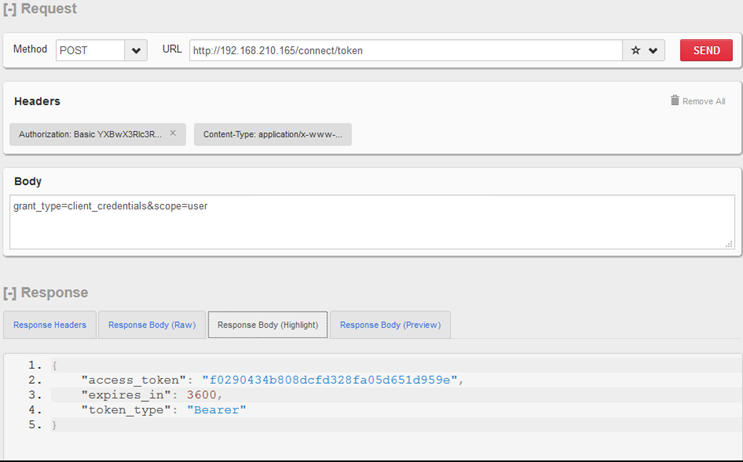基于 IdentityServer3 实现 OAuth 2.0 授权服务【客户端模式(Client Credentials Grant)】
github:https://github.com/IdentityServer/IdentityServer3/
documentation:https://identityserver.github.io/Documentation/
samples https://github.com/IdentityServer/IdentityServer3.Samples/
OAuth 2.0定义的四种授权方式。
- 授权码模式(authorization code)
- 简化模式(implicit)
- 密码模式(resource owner password credentials)
- 客户端模式(client credentials)
虽然之前已经基于 Katana 实现了 OAuth 2.0 的相关模式,后面发现 IdentityServer 要相对完善一些,IdentityServer 是属于 .NET Foundation 的一个子项目,IdentityServer3 是基于 Katana 开发的 OpenID Connect/OAuth 2.0 服务框架,虽然 Katana 微软已经不维护了,现已经属于 ASP.NET Core 的一部分,相应对应 ASP.NET Core 的版本是 IdentityServer4 ,还处于 Beta 版本;不过 IdentityServer3 的扩展 IdentityServer3.Integration.AspNetCore 支持 ASP.NET Core , 个人觉得 ASP.NET Core 设计很好,但是现在还不成熟,可能还需要等一段时间,所以选择了 IdentityServer3 。
授权角色
资源拥有者(resource owner):能授权访问受保护资源的一个实体,如新浪微博用户 irving;
资源服务器(resource server):存储受保护资源,客户端通过 access token 请求资源,资源服务器响应受保护资源给客户端;存储着用户 irving 的微博等信息。
授权服务器(authorization server):成功验证资源拥有者并获取授权之后,授权服务器颁发授权令牌(Access Token)给客户端。
客户端(client):如新浪微博第三方应用,也可以是它自己的官方应用;其本身不存储资源,而是资源拥有者授权通过后,使用它的授权(授权令牌)访问受保护资源,然后客户端把相应的数据展示出来。“客户端”术语不代表任何特定实现(如应用运行在一台服务器、桌面、手机或其他设备)。
Client Credentials Grant 模式只需要关注 授权服务器,资源服务器,客户端三个角色 具体:https://identityserver.github.io/Documentation/docsv2/overview/terminology.html
授权服务器
Install-Package IdentityServer3
服务配置
public class Startup { /// <summary> /// 配置idsv授权服务 /// </summary> /// <param name="app"></param> public void Configuration(IAppBuilder app) { var opts = new IdentityServerOptions { SiteName = "Embedded OAuth2 Service", EnableWelcomePage = true, Factory = new IdentityServerServiceFactory() .UseInMemoryClients(Clients.Get()) .UseInMemoryScopes(Scopes.Get()) .UseInMemoryUsers(new List<InMemoryUser>()), //.UseInMemoryUsers(Users.Get()) RequireSsl = false, //SigningCertificate = new X509Certificate2(string.Format(@"{0}\bin\identityServer\idsrv3test.pfx", AppDomain.CurrentDomain.BaseDirectory), "idsrv3test") }; app.UseIdentityServer(opts); /* //自定义路由 app.Map("/identity", idsrvApp => { idsrvApp.UseIdentityServer(opts); }); */ } }
客户端
public class Clients { public static List<Client> Get() { return new List<Client> { new Client { ClientName = "App接口服务", ClientId = "app_test_id", Enabled = true, AccessTokenType = AccessTokenType.Reference, Flow = Flows.ClientCredentials, ClientSecrets = new List<Secret> { new Secret("F621F470-9731-4A25-80EF-67A6F7C5F4B8".Sha256()) }, AllowedScopes = new List<string> { "user", "order" } } }; }
作用域
public class Scopes { public static List<Scope> Get() { return new List<Scope> { new Scope { Name = "user" }, new Scope { Name = "order" } }; } }
用户(客户端模式不需要用户参与所以没有用户数据)
完成上述工作,服务端基础服务就完成了,访问 /.well-known/openid-configuration ,可以获得服务的配置信息,暂且部署到 http://192.168.210.165 服务器上,配置信息如下(官方也就有服务端的示例: https://github.com/IdentityServer/demo.identityserver.io)
{ "issuer": "http://192.168.210.165", "jwks_uri": "http://192.168.210.165/.well-known/jwks", "authorization_endpoint": "http://192.168.210.165/connect/authorize", "token_endpoint": "http://192.168.210.165/connect/token", "userinfo_endpoint": "http://192.168.210.165/connect/userinfo", "end_session_endpoint": "http://192.168.210.165/connect/endsession", "check_session_iframe": "http://192.168.210.165/connect/checksession", "revocation_endpoint": "http://192.168.210.165/connect/revocation", "introspection_endpoint": "http://192.168.210.165/connect/introspect", "frontchannel_logout_supported": true, "frontchannel_logout_session_supported": true, "scopes_supported": [ "user", "order" ], "claims_supported": [ ], "response_types_supported": [ "code", "token", "id_token", "id_token token", "code id_token", "code token", "code id_token token" ], "response_modes_supported": [ "form_post", "query", "fragment" ], "grant_types_supported": [ "authorization_code", "client_credentials", "password", "refresh_token", "implicit" ], "subject_types_supported": [ "public" ], "id_token_signing_alg_values_supported": [ "RS256" ], "code_challenge_methods_supported": [ "plain", "S256" ], "token_endpoint_auth_methods_supported": [ "client_secret_post", "client_secret_basic" ] }
注意:寄宿到 IIS 中需要 WebConfig 配置中需配置:
<system.webServer> <modules runAllManagedModulesForAllRequests="true"> </modules> </system.webServer
资源服务器
Install-Package Microsoft.Owin.Host.SystemWeb
Install-Package Microsoft.AspNet.WebApi.Owin
Install-Package IdentityServer3.AccessTokenValidation
服务配置
public class Startup { /// <summary> /// 配置授权服务 /// </summary> /// <param name="app"></param> public void Configuration(IAppBuilder app) { app.UseIdentityServerBearerTokenAuthentication(new IdentityServerBearerTokenAuthenticationOptions { Authority = "http://192.168.210.165", ValidationMode = ValidationMode.ValidationEndpoint, EnableValidationResultCache = true, ValidationResultCacheDuration = TimeSpan.FromMinutes(5), RequiredScopes = new[] { "user", "order" } }); } }
控制器
[Route("api/v1/values")] public class ValuesController : ApiController { public IHttpActionResult Get() { var caller = User as ClaimsPrincipal; return Json(new { message = "OK computer", client = caller.FindFirst("client_id").Value }); } }
OK,完成,由于是一台测试服务器,部署到 http://192.168.210.165:88/ 端口。
客户端
Install-Package serilog
Install-Package serilog.sinks.literate
Install-Package IdentityModel
class Program { static void Main(string[] args) { var log = new LoggerConfiguration() .WriteTo .LiterateConsole(outputTemplate: "{Timestamp:HH:mm} [{Level}] ({Name:l}){NewLine} {Message}{NewLine}{Exception}") .CreateLogger(); var token = new TokenClient( "http://192.168.210.165/connect/token", "app_test_id", "F621F470-9731-4A25-80EF-67A6F7C5F4B8"); var response = token.RequestClientCredentialsAsync("user").Result; var client = new HttpClient(); client.SetBearerToken(response.AccessToken); log.Information(client.GetStringAsync("http://192.168.210.165:88/api/v1/values").Result); Console.ReadKey(); } }
测试
顺便使用Fiddler抓了一下包
POST http://192.168.210.165/connect/token HTTP/1.1 Accept: application/json Authorization: Basic YXBwX3Rlc3RfaWQ6RjYyMUY0NzAtOTczMS00QTI1LTgwRUYtNjdBNkY3QzVGNEI4 Content-Type: application/x-www-form-urlencoded Host: 192.168.210.165 Content-Length: 40 Expect: 100-continue Connection: Keep-Alive grant_type=client_credentials&scope=user
GET http://192.168.210.165:88/api/v1/values HTTP/1.1
Authorization: Bearer 9f82476751e1f8b93f1ea6df7de83b51
Host: 192.168.210.165:88
个人比较喜欢使用 Flurl.Http 这个类库,可以扩展一下客户端,扩展的方法现在还有一些问题,就不贴代码了。
其他细节:
- 生产环境最好加证书与HTTPS
- 客户端,作用域,持久化到DB(有EF的扩展 https://github.com/IdentityServer/IdentityServer3.EntityFramework )
- 票据的持久化与自定义验证
REFER:
Announcing IdentityServer for ASP.NET 5 and .NET Core
http://leastprivilege.com/2016/01/11/announcing-identityserver-for-asp-net-5-and-net-core/
OAuth2 Implicit Flow with Angular and ASP.NET Core 1.0 IdentityServer
http://damienbod.com/2015/11/08/oauth2-implicit-flow-with-angular-and-asp-net-5-identity-server
理解OAuth 2.0
http://www.ruanyifeng.com/blog/2014/05/oauth_2_0.html




 浙公网安备 33010602011771号
浙公网安备 33010602011771号